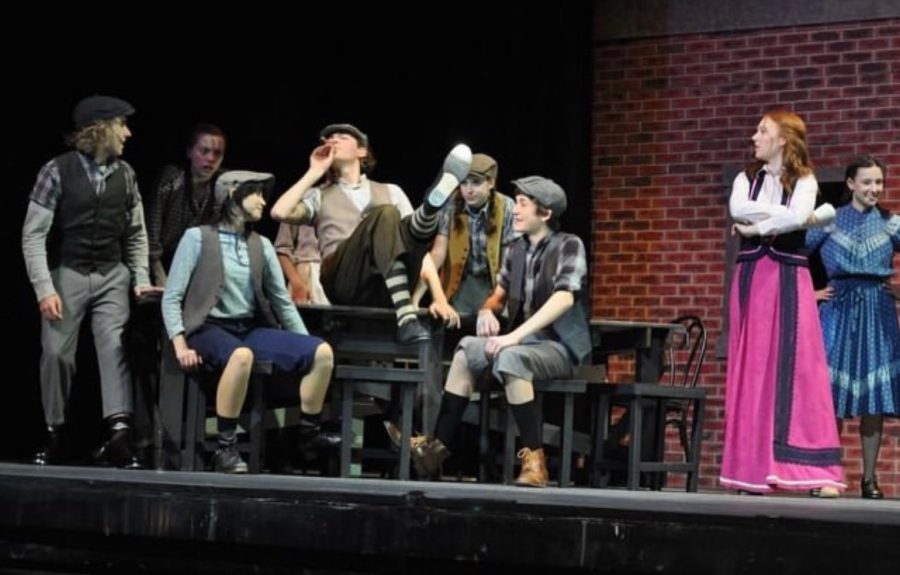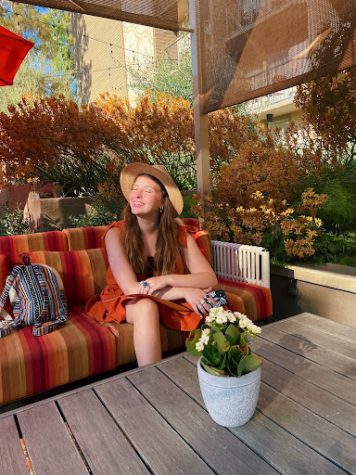A glimpse into the life of a theater applicant
John Turelli in the production of Newsies
February 21, 2023
Senior John Turelli is applying to colleges for musical theater, the theater application process is very different from a standard academic major. Here are 10 questions that dive into the formidable audition experience:
1. What is the theater application process like?
“The standard application process for a BFA musical theater applicant includes preparing your common app and your normal academic application, as well as submitting prescreens. That means you submit recordings of yourself singing various 32-bar cuts and performing minute-long monologues. You also have to submit a 45 second to a minute long dance video, which can be either jazz, tap or musical theater; some schools also require a 30 second ballet set of extension skills. Keep in mind every school is different and requires different repertoire. If you pass your prescreens, then you will schedule an audition in which you will perform similar repertoire in-person. A lot of the time schools will ask you for a third song or a new monologue, plus you will have a dance call. Along with the audition comes an interview and if you pass all of those steps you’ll be offered one of their spots.”
2. What was your main struggle throughout the audition process?
“My biggest struggle was remembering that someone else’s success is not necessarily my failure. I knew people that were finished with prescreens on August 1 and had their auditions scheduled by September 1, I was not like that. I submitted prescreens up until December but I’m still getting prescreen passes. Another struggle was convincing those around me that my field of interest is a viable career path and that the work I’m putting in now is going to mean something.”
3. What was unexpected about the audition process?
“Something that shocked me about the audition process is that I am having so much fun. I get to be in a room with some of the industry’s leading professors, I get to perform for them and I get their feedback. For one of my auditions I was told to do my monologue again while laying on the floor. I was expecting to be a nervous wreck but I have been having the time of my life.”
4. What is the best advice you have for someone who wants to apply to be a theater major?
“My best advice would first be to know what kind of program you want. If you want a BA degree, you have more flexibility to double major but you’re not gonna have the performance opportunities, performance classes or music education; whereas if you have a BFA degree you’re going to get a lot of conservatory style training with less flexibility on top of taking liberal arts classes. Also, there are a lot of people who will try telling you what it takes in order to get into college but ultimately you need to do what is right in getting into the right program for you.”
5. What made you decide to want to major in musical theater?
“In my heart, I am a storyteller. When I found out I could go to college to learn how to use my body, my voice, and my imagination so that I could tell stories for a living, I was sold. When you are deeply passionate about something, it sticks with you. Although it is difficult and requires a huge commitment, I don’t want to grow up and regret not pursuing my passion.”
6. How is the theater application process different from an academic major?
“Holistically, it requires more. With academic majors, they want to know what kind of student you are so they can decide whether or not they are comfortable investing in your academic capabilities. With a BFA degree, they also want to know what kind of person and performer you are because they are investing in your performance potential in addition to your academic capabilities. In their eyes, you are somewhat of a commodity and they want to be confident in knowing that they can help you learn how to market yourself.”
7. What’s something you enjoyed during the audition process?
“I have enjoyed making connections with current students and meeting successful people in an industry that is heavily frowned upon by the common person. Just learning overall has been very rewarding.”
8. What do you have to prepare for an audition?
“Usually, you are asked to prepare two songs, one upbeat and a ballad, one of which was written prior to 1970, and the other post 1970. They also usually require two monologues. You have to bring your dance shoes and an outfit that you can move comfortably in for the dance call. You also have to bring your whole audition book in case they want to hear additional selections. In most of my auditions so far they have asked me to sing either a third or fourth song.”
9. Do different schools require different repertoire?
“Yes, one school required me to perform three songs, a ballad, an uptempo, and a classical song. Another only wanted one monologue. Another wanted multiple, but required that one was comedic. Some dance calls require a tap or ballet audition while others are just a single combination. One did not even have a dance call, and instead required a sight reading, tonal memory, and musicianship evaluation.”
10. What do you plan on doing with your degree?
“My plan is to pursue a career in performance first. My dream in the commercial theater industry is to make it to broadway as a performer. College grads will normally begin working on cruise ships or at regional theaters and work their way up the food chain. At some point in my life, since a BFA in musical theater is basically a triple major between voice, acting, and dance, I would hope to direct, choreograph, compose, or even write. I’ve thought about possibly pursuing a masters or going to law school so that I might learn the business-side of the industry in order to produce. Later in life, I could own a training facility, work as a professor, or help run a non-profit theater. But for now, the dream is to perform.”







